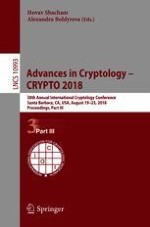2018 | OriginalPaper | Chapter
Fast Large-Scale Honest-Majority MPC for Malicious Adversaries
Authors : Koji Chida, Daniel Genkin, Koki Hamada, Dai Ikarashi, Ryo Kikuchi, Yehuda Lindell, Ariel Nof
Published in: Advances in Cryptology – CRYPTO 2018
Publisher: Springer International Publishing
Activate our intelligent search to find suitable subject content or patents.
Select sections of text to find matching patents with Artificial Intelligence. powered by
Select sections of text to find additional relevant content using AI-assisted search. powered by
